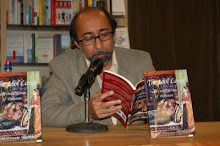This is the story of a man in his early 40s whose existence flits between feeling lonely and alone. The two states are not diametrically in opposition to each other, but they are not the same either. The difference is important and central to the story of Redhead by the Side of the Road.
Micah Mortimer’s life has not panned out as he had wanted. Starting as a bright computer science student, going into a startup tech business with a wealthy partner, he walked away to end up as Tech Hermit answering random calls from people who need their computer and printer problems fixed. He lives in a basement apartment of a building rent-free in exchange for serving as the manager. The youngest after four sisters, Micah can’t seem to hold on to a woman although even before he became a teenager “not even fully aware of sex, he had already longed to have a girl of his very own.”
The latest disruption, the one we witness in the narrative, is caused by a young boy, Brink, a runaway, who shows up outside Micah’s patch one morning out of the blue, claiming to be his son because he learned that Micah was the love of his mother’s life when she was young. Quick math puts that speculation to rest, but Micah ends up acquiescing to let him use the guest room just when Cass, his woman friend, is dealing with the fear of being evicted. Cass sees that as a signal from Micha that she is not welcome to move in with him, and no pleading, no amount of explanation would help change her mind. The case is closed. That’s the thick of it.
Micah, in his moments of solitude, looks back, wondering why women would leave him on one pretext or another. There are differences between Cass and him, but they are minor. There’s more care for the suffering in Cass’s worldview than that of Micah’s and he knows it, but their relationship has worked so far because both, as adults, recognize and respect each other’s physical and emotional space. But is there any place in Micah’s world for flexibility, for bending of the rules?
Anne Tyler, one of the most loved American authors of more than 20 novels, does not let the narrative either spin out of control or descend to irreversible tragedy. For the most part, it simmers on a constant low flame. The runaway boy is reunited with his mother and adoptive father, who develops respect for Micah. Cass takes Micah back. Brink’s mother and Micah’s college sweetheart, Lorna Bartell, is allowed to share her perspective with Micah of how and why their relationship fell apart.
This idea of a clash of perceptions between how men and women see certain events unfolding around their lives seems like a common theme now and brings to mind Clifford Garstang’s The Shaman of Turtle Valley, whose protagonist, Aiken, has a similar problem vis a vis the two most important women in his life with a far more serious issue on hand.
Read the rest here.
The latest disruption, the one we witness in the narrative, is caused by a young boy, Brink, a runaway, who shows up outside Micah’s patch one morning out of the blue, claiming to be his son because he learned that Micah was the love of his mother’s life when she was young. Quick math puts that speculation to rest, but Micah ends up acquiescing to let him use the guest room just when Cass, his woman friend, is dealing with the fear of being evicted. Cass sees that as a signal from Micha that she is not welcome to move in with him, and no pleading, no amount of explanation would help change her mind. The case is closed. That’s the thick of it.
Micah, in his moments of solitude, looks back, wondering why women would leave him on one pretext or another. There are differences between Cass and him, but they are minor. There’s more care for the suffering in Cass’s worldview than that of Micah’s and he knows it, but their relationship has worked so far because both, as adults, recognize and respect each other’s physical and emotional space. But is there any place in Micah’s world for flexibility, for bending of the rules?
Anne Tyler, one of the most loved American authors of more than 20 novels, does not let the narrative either spin out of control or descend to irreversible tragedy. For the most part, it simmers on a constant low flame. The runaway boy is reunited with his mother and adoptive father, who develops respect for Micah. Cass takes Micah back. Brink’s mother and Micah’s college sweetheart, Lorna Bartell, is allowed to share her perspective with Micah of how and why their relationship fell apart.
This idea of a clash of perceptions between how men and women see certain events unfolding around their lives seems like a common theme now and brings to mind Clifford Garstang’s The Shaman of Turtle Valley, whose protagonist, Aiken, has a similar problem vis a vis the two most important women in his life with a far more serious issue on hand.
Read the rest here.

